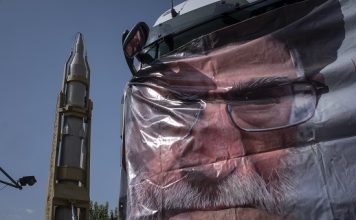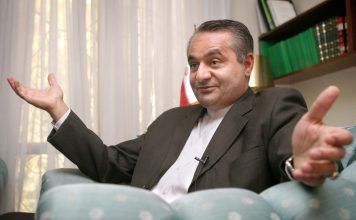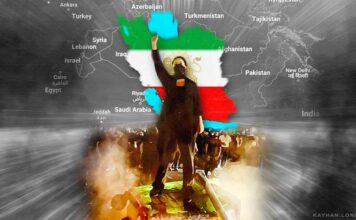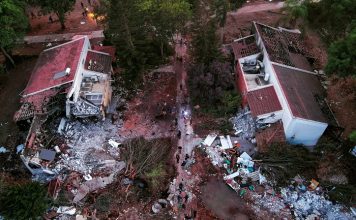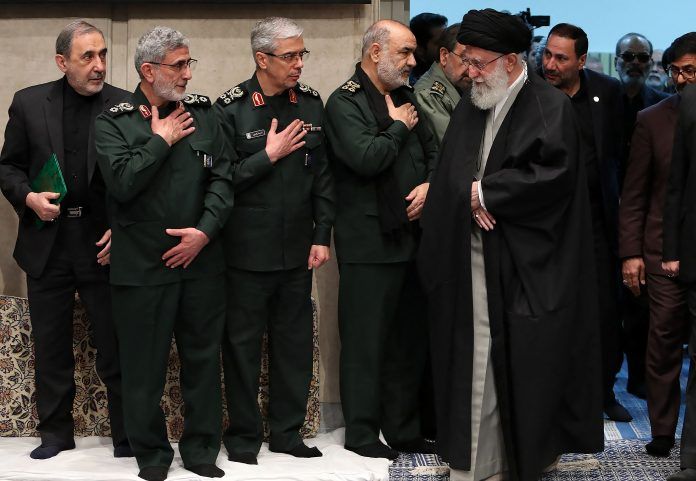
The Iranian authorities have urged the public to take part in the forthcoming presidential election in June.
In his first public address since the start of the Iranian new year on March 21, Iran’s Supreme Leader Ayatollah Ali Khamenei said people’s participation in the presidential election and the country’s diplomatic and defense capabilities would reaffirm “our national strength.”
Other senior clerics and government officials have echoed Mr. Khamenei’s assertion.
Seyyed Ahmad Khatami, a member of the Assembly of Experts, said any vote cast in the election would “reaffirm” the Islamic Republic system of government.
The number of Islamic Revolutionary Guards Corps (IRGC) commanders running in the forthcoming presidential election exceeds candidates with military backgrounds in previous ones.
They include Hossein Dehghan, a special advisor to Mr. Khamenei in military affairs. Mr. Dehghan is a former Defense Minister in President Rouhani’s first cabinet (2013-2017) and served as the IRGC commander for Tehran and Isfahan.
[aesop_image img=”https://kayhanlife.com/wp-content/uploads/2020/02/dehghan_8y87.jpg” panorama=”off” credit=”Hossein Dehghan, an advisor to Iran’s Supreme Leader Ayatollah Ali Khamenei. KAYHAN LONDON” align=”center” lightbox=”on” captionsrc=”custom” captionposition=”left” revealfx=”off” overlay_revealfx=”off”]
Second Brigadier General Saeed Mohammad, commander of the Khatam al-Anbiya Construction Headquarters (the engineering wing of the IRGC) has also announced his candidacy.
Other former IRGC commanders who are likely to run in the election include the Secretary of the Expediency Council Mohsen Rezaei (who ran in the 2009 election) and the Speaker of the Majlis (Iranian Parliament) Mohammad Bagher Ghalibaf (who ran in the 2013 election).
This group of former and current IRGC commanders with presidential aspirations have one thing in common: they all claim to have impeccable revolutionary credentials.
They also argue that the revolution has created a successful governing system. They praise Iran’s ballistic missile program and regional military adventures, which are the exact issues the West insists on incorporating in any new nuclear negotiation.
The IRGC has clarified its intentions. Its commanders have spoken about their agenda in their speeches.
Brigadier General Amir-Ali Hajizadeh, the IRGC’s Aerospace Force commander, recently argued in favor of a future “revolutionary government.”
In comments reported by the Tasnim News Agency on Jan. 2, General Hajizadeh said: “The [ballistic] missile program is not open for discussion. No official has the authority to hold talks over the missile capability, which is our red line.”
“Each vote is a missile aimed at the enemy’s heart,” Tasnim quoted General Hajizadeh as saying on Feb. 20, 2020.
General Hajizadeh’s unit was allegedly responsible for the “unintentional” downing of the Ukrainian commercial Flight PS752 near Tehran’s Imam Khomeini International Airport on Jan. 8, 2020, which killed all 176 people on board.
[aesop_image img=”https://kayhanlife.com/wp-content/uploads/2020/04/2020-04-22T122744Z_843720935_RC2O9G93QFQE_RTRMADP_3_IRAN-SATELLITE.jpg” panorama=”off” credit=”Amirali Hajizadeh, head of the aerospace division of the Revolutionary Guards, stands before a launch of the first military satellite named Noor into orbit by the Iran’s Revolutionary Guards Corpse, in Semnan, Iran April 22, 2020. REUTERS./” align=”center” lightbox=”on” captionsrc=”custom” captionposition=”left” revealfx=”off” overlay_revealfx=”off”]
Khamenei has repeatedly said that Iran’s ballistic missile program and regional activities are an integral part of “the revolution’s dignity” and are not negotiable.
In comments reported by the Iranian Students News Agency (IRNA) on Feb. 10, the Tehran Friday prayer leader said: “Each vote is another yes to the Islamic Republic system.”
Reformists echo the same sentiments.
In an interview with the Tehran-based Didar News earlier this month, Sadegh Kharrazi, the secretary-general of Nedaye Iranian Party (NEDA), also known as the Second Generation of Reforms, said: “The Qods Force and Iran’s missile program are not open for discussion,”
A month earlier, the Tehran-based Khabar Online quoted Mr. Kharrazi as saying that “conservatives want to silence the public or filter everything.”
Reformists, whose popularity has diminished significantly, have been trying to generate support by making the forthcoming election a choice between “extremists” and “moderates.” While warning the public that low voter turnout would lead to a military government’s election, they are deep in cahoots with extremists and the IRGC.
Prominent reformist figures in Iran such as Abbas Abdi and Mostafa Tajzadeh constantly warn the public about a future military government. They completely ignore statements by politicians on both sides of the political spectrum who have repeatedly said that “reformists and conservatives are in the same boat.”
Iranian Foreign Minister Mohammad Javad Zarif expressed similar views in a speech on July 23, 2018, noting: “We are all in the same ship.”
Reformists and conservatives are equally responsible for the crisis facing the country. They are the regime’s political arms and operate directly under Khamenei’s auspices.
Conservatives and reformists support Iran’s regional activities and funding of Shia militias in the region and have benefited from the revolution’s windfalls.
While conservatives, clergy, and the IRGC openly support the “resistance front,” the reformists operate behind the scene to advance these plans.
Both President Rouhani and Foreign Minister Zarif have frequently reiterated Khamenei’s mantra that “Iran’s missile program was not open for discussion.”
Mr. Zarif — hailed as a skillful diplomat by reformists and dubbed “a contemporary Amir Kabir” — plays a crucial role in peddling a softer and gentler image of the otherwise hardline and autocratic Islamic Republic to the international community.
He continually denies the clear and present danger posed by Iran’s nuclear activities, ballistic missile program, and regional ambitions.
[aesop_image img=”https://kayhanlife.com/wp-content/uploads/2019/02/Capture.jpg” panorama=”off” credit=”Javad zarif (R) Ghassem Soleimani (L). Source: Kayhan London [unknown location and date] ” align=”center” lightbox=”on” captionsrc=”custom” captionposition=”left” revealfx=”off” overlay_revealfx=”off”]
Mirza Taghi Khan Farahani, better known as Amir Kabir, was the chief minister of Naser al-Din Shah Qajar from 1848 until 1851. He was arguably Iran’s first reformer politician, who tried to modernize the country.
Zarif and the Islamic Republic’s diplomatic apparatus implement Valiye Faqih’s (supreme jurisconsult) decrees.
Since taking office eight years ago, Zarif and his fellow reformists have only advanced Khamenei and IRGC’s agenda. Zarif repeats, almost verbatim, IRGC’s explanation for supporting Syrian President Bashar al-Assad and involvement in the Syrian war.
In an interview with Etemad online newspaper on Jan. 23, Zarif said: “A foreign minister must defend the country’s official policies and implement state policies.”
“One might have played a minor role in setting a policy,” Zarif explained. “While I played a more significant role in drafting the Joint Comprehensive Plan of Action JCPOA [better known as the Iran nuclear deal], I had a much more limited impact on setting regional policies. I also took a major part in developing Iran’s relationship with Russia, China, and Latin America.”
“I played a less significant role in setting Iran’s regional policies,” Zarif noted. “My job was to implement these policies and defend the Islamic Republic’s actions. Sometimes, I did not approve of certain policies. I am not referring to any of the regional policies. Some policies threw obstacles in my path.”
“When I am on the world stage, I represent the state’s policy in its entirety,” Zarif added. “I might have to defend things I do not believe in or am critical of, but I also know that people who oppose those policies do not have Iran’s best interests at heart.”
To vote in a supervised election, irrespective of the candidate means supporting the Islamic Republic’s warmongering regime.
Instead of investing the national treasury in its people, the regime has used the money to fund Palestinian Hamas, Lebanese Hezbollah, Yemeni Houthis, and the Popular Mobilization Forces (PMF).
The PMF is an Iraqi state-sponsored umbrella organization comprising some 40 militias that are primarily Shia Muslim groups and include Sunni Muslim, Christian, and Yazidi groups.
The principal supporter of the Qods Force’s Syrian campaign has been the reformist Executives of Construction of Iran Party, founded in 1996 by the cabinet members of the former Iranian President, the late Akbar Hashemi Rafsanjani.
Using government loans, some members of the Executives of Construction of Iran Party have allegedly taken over several private and semi-government institutions. They supposedly work as contractors with the IRGC.
Some believe that Reformists made the former commander of the Qods Force, Lieutenant General Ghasem Soleimani, into a “national hero” and dubbed him and Foreign Minister Zarif as the “two wings” of the Islamic Republic system.
General Soleimani was killed in a U.S. drone attack on Baghdad International Airport on Jan. 3, 2020.
After the U.S. designated the IRGC a terrorist organization in April 2019, several reformist Majlis representatives showed their support for the force by wearing IRGC uniforms on the assembly floor.
They included Mohammad Reza Aref, Mahmoud Sadeghi, and Elias Hazrati, all three representing Tehran, Rey, Shemiranat, and Eslamshahr electoral districts.
These politicians know that the IRGC and security forces have brutally put down nationwide protests in recent years, injuring and killing scores of people. Therefore, any vote cast in the election will support a murderous regime.
Reformists have close links to the IRGC.
In 2016, authorities filed financial corruption charges against Mehdi Jahangiri, a brother of Eshaq Jahangiri, Iran’s first vice president. Only after General Soleimani interceded on his behalf, authorities released Mr. Jahangiri on a significantly reduced bail.
Mehrdad Jahangiri was ultimately convicted of illegal trade of foreign currencies and sentenced to two-year imprisonment.
In recent days, many Iranians inside and outside the country have joined an online campaign titled “No to the Islamic Republic,” launched earlier this month by hundreds of Iranian political dissidents, activists, artists, athletes, and academics living abroad.
The campaign is also a protest against the election. Lack of public participation in the election would hurt the Islamic Republic within Iran as well as in the Middle East and in the international community.
During a ceremony to honor student martyrs on Feb. 6. 2020, the commander of the IRGC’s Beit ol-Moqaddas base in Kurdistan Province, Brigadier General Seyyed Hosseini, said: “The governing system is meaningless without the people’s presence and support.”

